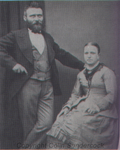|
|
|||
 Richard Bowey Richard BoweyBorn Devon, United Kingdom Occupation: Blacksmith Mr. and Mrs Richard Bowey, with eight children, the youngest 10 months old, left Devonshire, England, in 1856. They travelled in the sailing boat "Stormy Cloud," which took 70 odd days to get to South Australia. At Port Adelaide they were met by a brother-in-law with bullocks and dray, and taken to Hartley Vale. They lived in a hut kindly lent by Mr. Moore, until Mr. Bowey, who was a blacksinith, went to Gumeracha and started business there in the main street. The business progressed, and he erected a stone building containing two sections, one for the smithy and one for wheelwright work. He was assisted by his two sons, Richard as wheelwright, and Henry as blacksmith. For sometime the trade done with waggon teams carting between Mannurn and Adelaide, and also meeting local requirements, was so extensive as to necessitate the employment of five wheelwrights and four blacksmiths including three apprentices, and a painter. The working hours were from 6 a.m. to 6 p.m. They were not afraid of work in those days! In 1874 the railway to Morgan was opened, and this took the trade of the Murray direct to Adelaide instead of through Gumeracha, with the result that Mr. Bowey, senr., and his sons Richard and William selected and took up land on Yorke's Peninsula. Henry continued conducting the Gumeracha business for many years, and subsequently William removed to Salisbury, where he still resides, and celebrates his 87th birthday this year (1939). We of a later generation always remember the old bell that was rung for starting and terminating work at "Bowey's blacksmith shop" because it seemed to toll out "Dick Bow-ey ; Dick Bow-ey ; Dick Bow-ey !" At an auction sale later it was purchased by John and Will Formby, of Kenton Valley, for use on their farm. It was at the back of this old blacksmith's shop that a dreadful tragedy occurred on the 31st December, 1928, by which three fine men lost their lives. George Farley, the then proprietor of the business was down the well adjusting the pump when a terrific explosion took place. A workmate and lifelong friend of George's, William Crook, who was busy about ten yards distant, rushed immediately to the mouth of the well and descended, partly by ladder and then hand over hand down the pump piping. By this time one or two others had reached the well, and hearing nothing and getting no response from down below, Mounted Constable George T. Smith, who lived next door to the smithy, proceeded down the ladder, but finding he was unable to effect a rescue he decided to ascend. When nearing the top of the well, however, he collapsed and fell. Immediately following this, Don. Norsworthy, who had arrived from the adjoining store, was lowered by a rope to make an effort at rescue, but before he could reach any of the three men he was forced to make a call to be pulled up. This was done only in the nick of time, as he lost consciousness during the ascent, and was almost slipping out of the rope when taken from the top of the well. After working boughs up and down, and freshening the air in the well, Messrs. Fred Schultz and F. Fry also made endeavours to locate the bodies and after some difficulty the former secured Constable Smith's body, but all efforts to effect resuscitation were unsuccessful. Finally the help of the Adelaide Fire Brigade was obtained, and with the aid of gas masks the two remaining bodies were recovered. It is not known what caused the unfortunate explosion, and the finding of the Coroner, who made a careful investigation, was that the three men met their deaths accidentally by asphyxiation and drowning. Probably in the whole history of South Australia there have been no finer acts of bravery than those exhibited at Gumeracha on the 31st December, 1928, by William Crook and Constable Smith, and later by Don. Norsworthy, Fred Schultz, and F. Fry. It was only fitting, therefore, that their magnificent courage should have led the public to erect a beautiful red granite archway suitably inscribed, in front of the local Town Hall, to serve as a perpetual memorial to commemorate the courageous conduct of these heroes. At the opening- ceremony of the archway by Mr. J. B. Randell, J.P., the opportunity was taken of making presentations of five gold, medals on behalf of the subscribers - two posthumously through the relatives of Mr. Crook and Constable Smith, and the others to Messrs. Norsworthy, Schultz, and Fry. On the 15th September, 1929, at Government House, Adelaide, the three latter gentlemen were each presented by His Excellency the Governor, Sir Alexander Hore-Ruthven, V.C., K.C.M.G., C.B., C.M.G., D.S.O., now Lord Gowrie, Governor-General of Australia, with the silver medal of the Royal Humane Society of Australasia. Emigrated (29 Apr 1858) on "Storm Cloud"
Married/ Related to: Marriages. BOWEY-SANDERCOCK. On the 25th September, by licence, by the Rev. H.L. Tuck, Henry Stoneman, second son of Richard Bowey, of Gumeracha, to Louisa, second daughter of Richard Sandercock, Gumeracha. [Obs 12/10/1867 5f.] Children: 1.
 Richard Bowey Richard BoweyBorn < 1847 2.
 Henry Stoneman Bowey Henry Stoneman BoweyBorn 11 Mar 1847 Modbury, Devon, United Kingdom Died 14 Aug 1917 Enfield, South Australia, Australia, age 70 years Buried Payneham, South Australia, Australia Payneham Cemetery Occupation: Blacksmith Louisa and Henry Bowey  Louisa and Henry Bowey Louisa and Henry Bowey Emigrated (29 Apr 1858) "Storm Cloud" 3.
 William Bowey William Bowey | |||
Family events
Citation for: Family Page
"Family Page: Richard Bowey & Mary -." HuMo-genealogy - Colin Sandercock's Family Tree (http://sandercock.net/family/index.php?page=family&tree_id=2&id=F44&main_person=I2928 : accessed 20 April 2024) Richard Bowey #I1736, born Devon, United Kingdom
| User notes | There are 0 user added notes. | |
|---|---|---|
